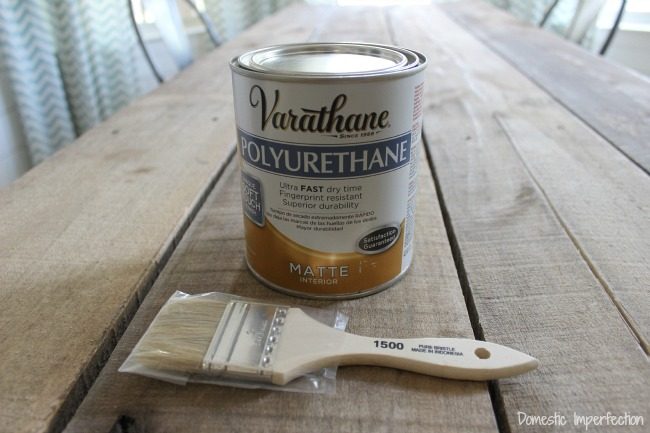How Can I Tell if Paint Is Oil Based

Imagine you spend forever sanding, priming, and painting a beautiful piece of furniture you found at a garage sale. It looks fantastic…you breathed new life into it like a freaking pro. Go you! The last step is to protect the paint so it looks this amazing forever. You grab a sealer from the hardware store without much thought…because sealer is sealer, right? Except it's not, and your entire project turns yellow and streaky, completely ruining it.

As you can see in the above photo, this has happened to me…multiple times. It sucks, and I don't want the same thing to happen to you. So let's have a fun little conversation about a very boring subject…water-based vs oil-based sealers (There are a crazy amount of options for sealer, but today we are going to keep things simple and just talk about those two).
No matter how many confusing names they give sealers for the purposes of this post they boil down to two categories – Oil-based sealers and water-based sealers. Here are a few facts about each type –
Oil-based sealers
- Offers great protection
- Strong odor
- Has an amber tint
- Has a long cure time (24 hours or more before recoat)
- Less expensive than water-based poly
- Thicker and requires fewer coats than a water-based sealer
- Must be cleaned up with mineral spirits
- Will yellow over time (and will ruin painted projects)
- Gives wood a deeper, richer color
Water-based sealers
- Offers great protection (some say less than oil-based, but I haven't found that to be true)
- Looks milky in the can, goes on completely clear
- Shorter cure time (4-hour recoat or less)
- More expensive than oil-based poly
- Can be cleaned up with water
- Stays clear over the years
- Can look dull on wood pieces
This gets even more confusing because they now mix and match names – I once bought and used a can labeled "water-based oil-modified polyurethane" I mean….what the hell does that even mean?

I used it and can tell you exactly what it means…it means it will turn yellow and ruin your entire painted project. If the can says oil on it, no matter how much it also says the word water elsewhere on the can… it will yellow over time.
Which sealer should I choose?
I choose to use a water-based sealer on about 95% of my projects.
There are countless things out there that need sealer, but for this post we are talking about small household DIY projects…furniture, cabinets, doors, etc. For these types of projects, I choose a water-based sealer 95% of the time. Why? It's simple to use (easy cleanup, quick dry time), offers fantastic protection, and DOESN'T YELLOW. Not yellowing is the kicker here. If the thing you are sealing is painted, then you absolutely need to be using a water-based sealer. I am telling you from experience that if you use an oil-based sealer over paint it will look horriblein about a week. The finish will turn yellow and streaky and you will be forced to redo your entire project.
There are a few instances where I will choose an oil-based sealer. If the project is wooden, sometimes an oil-based sealer is a better choice because it gives the wood depth and color than water-based can't provide. If you are sealing a wood that usually looks great with an orangy/amber tint, choose an oil-based sealer…water-based may make your project look dull and lifeless. If your wood project is whitewashed, a gray shade, rustic barn wood, or a shallow light wood like maple, go water-based.

My current favorite is made by Varathane, it's a is a water-based sealer that has never failed me. Plus it's cheap. It comes in all different sheens, satin is probably the most popular. I personally am a big fan of the matte because I don't like my finishes to me shiny at all, and this is a great one.
Anyway, that is a very simplified answer to the oil vs. water debate, but hopefully you found it helpful! If you have any specific questions please ask in the comments, I have spent an embarrassing amount of time experimenting with sellers over the years and I would love to put that knowledge to good use!
You may also like –
My butcher block countertops, two years later (which sealer to use??)
Experimenting with sealers for my paper bag floors
The ultimate guide to painting cabinets
DIY concrete countertops part III – sealing
DIY epoxy garage floor
How Can I Tell if Paint Is Oil Based
Source: https://www.domesticimperfection.com/oil-based-vs-water-based-sealer/

0 Response to "How Can I Tell if Paint Is Oil Based"
Post a Comment